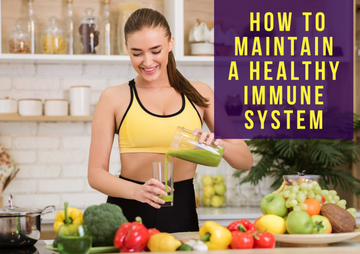How To Maintain A Healthy Immune System
You are not helpless. If you listen to the news, you might believe that the only way to prevent becoming sick is to hide in your home. While minimizing your exposure is an excellent first step in keeping yourself safe from infection, bear in mind that your body is capable of protecting itself.
The better you take care of your immune system, the better your odds of surviving any microbe storm that comes your way. The key to preventing sickness, then, is to take an active part in supporting the system that prevents it, rather than simply stowing away until it's safe to come out.
We'll start by looking at how your immune system works, and then we'll teach you how to keep it up and running smoothly.
How your Immune System Function
Your body is always on watch for anything that should not be entering it. When your body detects an intruder, whether it's a bacteria, allergy, or a virus, the immune system goes into action to attempt to get rid of it as soon as possible.
The first set of defense mechanisms it utilizes to do this is not likely known to you and you may already associate them with warning signals that you are becoming ill. You may have a headache as you begin to cough and sneeze while your eyes start watering.
If those first defenses fail to eliminate the threat, the invading material can gain a stronghold in your body and begin to make you feel uncomfortable. Viruses attach to healthy cells and utilize them as hosts to reproduce and spread. Bacteria divide within the body, crowding out healthy cells, interrupting their usual activities and potentially destroying tissue.
At this phase, your immune system recognizes the need for extreme action and turns up the temperature. It generates fever-inducing cytokines, the proteins interleukin-1 and interleukin-6, which pass the blood-brain barrier to alert the hypothalamus in the brain that the body's thermal set point needs to be elevated.
And that is when your forehead becomes heated and the shivers set in as your muscles tense in an attempt to elevate your body temperature. (You feel chilled because your body is cooler than the temperature your immune system is attempting to increase to.)
These symptoms make you feel miserable and they are indicators that you are terribly sick, but they are also crucial in shifting the outcome of the battle. The fever's heat slows the spread of germs and viruses and can even kill them altogether.
The body is launching a counter-offensive. It activates white blood cells, especially phagocytes, which engulf and kill the intruding virus or bacteria. Some of these blood cells produce antibodies, which are cells that know the DNA of the intruders so that the body can detect them and eliminate them earlier if they return.
The body is launching a counter-offensive. It activates white blood cells, especially phagocytes, which captures and kills the intruding virus or bacteria. Some of these blood cells produce antibodies, which are cells that know the DNA of the intruders so that the body can detect them and eliminate them earlier if they return.
Your immune system is an army that will win numerous battles throughout the course of your life. However, like any army, it is most successful when it has sufficient resources and is not required to fight conflicts on numerous occasions. As a result, maintaining it in good shape and keeping it well-provided should always be a top concern.
Methods for Boosting Your Immune System
There are three approaches to promoting immunological health. None of them, individually or collectively, can ensure that you'll never feel ill again, but they'll do everything they can to keep your troops vigilant and on the battlefield.
#1 Reduce Your System's Workload
This ultimately comes down to just steering clear of stress of any sort, which includes tension from hard exercises as well as anguish caused by your employer or your family.
In fact, exercise is always beneficial to your health (more about this in point #3), whereas if you believe you have been subjected to someone who is unwell, or if you are beginning to detect the early signs of an illness, reduce your exercises or remain at home and relax.
Intense exercise stimulates an immunological response, and if the body is already fighting infections and germs, you are simply splitting your efforts.
The risk of stress stems from an increase in free radicals. These are results of chemical processes in your body that result in electron-deficient compounds. As a result, these molecules are now very unstable and capable of causing damage to DNA, lipids and proteins.
They perform a useful function at normal levels, alerting the immune system to approaching intruders. Although when they go out of line, they cause alterations in cells or destroy them. The buildup of free radicals is considered to be a precursor to significant health issues.
When you drink alcohol, prepare meals (especially at high temperatures with unstable polyunsaturated oils) and exercise excessively, you are exposed to pollutants or radiation (even from sunshine), and experience any level of mental stress, free radicals build. Many of these things are, of course, difficult and costly to avoid, so don't believe you have to live in isolation. Simply restrict your exposure to high amounts of them.
While you are attempting to avoid stress in the near term, you may also practice strategies that will assist you in controlling it in the long run. Spending more time in nature (walks and forest baths) as easy as it sounds, has been proved to have highly significant benefits on stress and may even lower your risk for particular diseases. Mindfulness and relaxation may even have the same effect.
However, nothing may be more beneficial to your immune system than obtaining more sleep. A review published in Frontiers in Bioscience determined that sleep reduces oxidative stress (the accumulation of free radicals), which can cause issues in the heart, brain and other organs.
And just because you're young and fit doesn't indicate you can continue to stay up late. According to a 2018 study, active physical education students with the average age of 21, participated in a brief survival training class that deprived them of sleep and saw massive increases in oxidative stress levels. Thankfully, the study also revealed that following up on sleep subsequently assisted the individuals in returning to normal.
#2 Maintain Your Cleanliness
This is a continuation of tip #1, but it deserves its own section. Avoid contact with ill individuals and handling potentially infected objects while observing basic hygiene to limit the possibility of germs adhering onto your skin.
Now this is where hand-washing comes into play. According to the Centers for Disease Control and Prevention (CDC), it is still one of the most effective strategies to avoid becoming sick. And, as basic as hand-washing is, chances are you're not doing it the way the government wants you to. According to the CDC, these are the proper measures to take.
1.Soak your hands with running water. It makes no difference whether it is warm or cold.
2. Lather up with soap. Contrary to common perception, antibacterial soaps are no better than regular soap, therefore any soap will suffice.
3. Turn off the water supply (to save water).
4. Lather your hands with the soap by rubbing them together. Don't forget to wash the backs of your hands and the spaces in between your fingers and don't forget to get soap beneath your nails. Continue for at least 20 seconds.
5. Reopen the faucet and rinse your hands. Yes, you'll have to touch the faucet handle again, but the CDC says there's little need to be concerned about contamination.
6. Dry your hands with a clean towel (paper or cloth) or just let them air dry
Hand sanitizers are another alternative, but according to the CDC, they are only your best bet if you can't even get to a sink. There hasn't been much research comparing hand washing to hand sanitizing, but a 2019 study discovered that basic washing eliminated the flu virus from hands better than an alcohol-based gel.
However there are extreme instances and are most important when dealing with disease outbreaks, social distance and isolation are also useful techniques of remaining germ-free. Surgical masks have indeed been proven to be useful as a barrier, reducing the transfer of infections to others while the user is unwell, however they won't be enough to keep particles from entering your lungs through touch.
Improve Immune Health
Supplements and what you eat can have a major impact on your immunological response. Fruits, veggies, mushrooms and grains should be pillars in your diet for maximum immunological health, because the more varied combinations you can put on your plate, the better. Colorful produce is high in phytonutrients, which are plant components with antioxidants Vitamins A, C, and E as well as antioxidant-like characteristics that help combat free radicals.
Pay special attention to citrus fruits, which are high in Vitamin C which is one of the most well investigated and powerful antioxidants, contributes in the maintenance of cellular integrity by assisting cell membranes in keeping foreign substances out.
This vitamin is also a key component of bone, blood vessels and ligaments, contributes in the synthesis of carnitine (an amino acid that produces energy), and promotes the creation of neurotransmitters (the body's chemical messengers).
 Immune Supplements On Amazon
Immune Supplements On Amazon
Mushrooms are one food that you almost likely don't get enough of. They're an overlooked immune-supporting resource because they're packed with a range of beneficial properties.
Mushrooms also include polysaccharides, which function as a prebiotic, providing food for the healthy bacteria in your stomach that consume the harmful bacteria that can make you sick. One polysaccharide in particularly, beta-glucan, supports the immune system through a different method.
When you ingest beta-glucan, your body does not perceive it as food. It is safe to consume, yet your system believes it is harmful. This activates your immune system in an attempt to defend you against beta-glucan, as if it were a foreign intruder. As a response, your immune systems are activated and you can help eliminate other possible dangers to your body before they overwhelm you.
Chaga is a kind of fungus that should be on your shopping list. It is generally obtained as a tea or supplement. It has been proven to be very beneficial in preserving cell integrity.
Don't overlook items that are served as a side dish or as a spice for your main course. According to research, two widely used spices, ginger and turmeric, can be helpful when consumed or supplemented.
A research in the International Journal of Preventive Medicine found that ginger helps the body clean away oxidative stress, while a study in the Journal of Clinical Immunology found that turmeric's potential to enhance immune system function is due to its curcumin concentration.
The technique that you use to prepare your food has a significant influence on its health potential. Polyunsaturated fats in vegetable oils are unstable at high temperatures and will oxidize when cooked with, producing free radicals.
Micro Ingredients Organic Chaga Mushroom Extract
Saturated fat sources, such as coconut oil, MCT oil and butter, remain stable at high temperatures and are hence preferable (1, 2, 3). Additionally, coconut oil and MCT oil have antibacterial and antifungal characteristics that may aid in immunological resistance.
This is not to suggest that all microorganisms must be eradicated. Understand that there is also beneficial bacteria and the type that lives in your gut has a big influence on how your immune system operates. In fact, the gut contains 70 percent of the body's immunity-supporting cells.
Probiotics are beneficial bacteria that may be increased by consuming more fermented foods, such as yogurt, or by taking probiotic supplements. Probiotics support immunological function by consuming harmful bacteria and improving the quality of your body's mucus, therefore producing a better trap for intruders to become trapped in and subsequently flushed out. One potent probiotic isn't really a probiotic, but it works like one.
Saccharomyces boulardii is a yeast found in lychees and mangosteens, although it is more easily obtained as a supplement. It aids in the production of antibodies (the cells that keep you from being ill again from the very same invaders) and promotes communication between immune system cells, enabling for a more coordinated immune reaction.
Finally, Exercising- Due to the advantages it provides to your muscles, heart, bones and connective tissues in terms of overall lifespan and plays a number of roles in keeping you out of the doctor's office.
Similar to a fever, the brief but considerable rise in body temperature caused by exercise may help prevent germs from growing. Exercise, like a fever, causes a temporary but considerable boost in body temperature, which may aid in the prevention of bacterial growth.
So, unless you're feeling unwell, keep working out!
Check out our previous articles!
How to Get Started with Your Own Exercise Program
10 Benefits Of Working Out With A Friend!
How a 10 Minute Walk Can Improve Your Overall Well Being
6 Light Stretches to Help You Sleep Better
5 Simple Stretches to Relieve Lower Back Pain


























